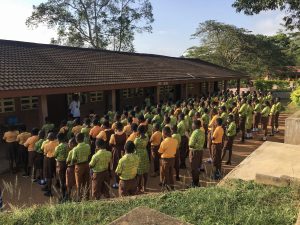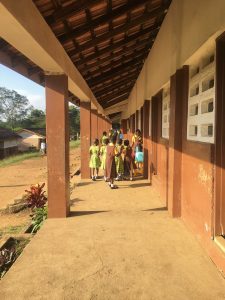As I sat in the staff room at my school one afternoon just after classes closed for the day, the sound of students playing outside and the hot, humid air surrounded me. Not surrounding me, though, were three of the four 4-H advisors who agreed to meet with me that day so we could discuss club activities and the 4-H garden. About 15 minutes after our meeting was supposed to start, the one advisor who was there asked me if we were still having a meeting. I said yes, and then went out to track down the others. I searched the school and found out that one of the other advisors left school an hour early. I never found the other two. This was already the third time we had rescheduled this particular meeting, and I was quickly losing hope that I’d ever get these four people in a room at the same time.
Adjusting to cultural norms with scheduling has been one of the toughest challenges I’ve faced here. As a whole, American  society keeps a fairly rigid schedule. I personally always have my planner on me, chalked full of “to do” lists and records of all my upcoming events and activities. Ghanaian scheduling is a little more flexible, and very different from the “if you’re 10 minutes early, you’re late” philosophy that my high school cheer coach ingrained in me. When school in the United States is scheduled to begin at 8 a.m., teachers are in their classrooms before then, students arrive when the bell is rung, and lessons start promptly at 8. When school in Ghana is scheduled to begin at 8 a.m., some students will be in the classroom around that time. Teachers may show up 10 minutes later or halfway through the period, or they may decide to just not come to class that day.
society keeps a fairly rigid schedule. I personally always have my planner on me, chalked full of “to do” lists and records of all my upcoming events and activities. Ghanaian scheduling is a little more flexible, and very different from the “if you’re 10 minutes early, you’re late” philosophy that my high school cheer coach ingrained in me. When school in the United States is scheduled to begin at 8 a.m., teachers are in their classrooms before then, students arrive when the bell is rung, and lessons start promptly at 8. When school in Ghana is scheduled to begin at 8 a.m., some students will be in the classroom around that time. Teachers may show up 10 minutes later or halfway through the period, or they may decide to just not come to class that day.
Now, these are broad generalizations. I recognize that not every American follows through with plans, just like not every Ghanaian is always late. However, any time I’ve brought this topic up with a Ghanaian, from our culture teacher during pre-service training to my co-teachers, they’ve all readily agreed that Ghanaians are typically less inclined to stick to a schedule, which is socially acceptable in their culture.
A contributing factor to why this has been a difficult adjustment for me is my limited time in Ghana. With only four months in country total, and less than one month left now, I feel a lot of pressure to get quality work done quickly. I’ve realized, though, that it’s not about my timeline. I’m only here for a short time, and I can’t expect my school to change their habits and routines (however variable they may be) just because I’m here working with them. Instead, my mindset had to change. Rather than getting caught up in the challenges I’m facing and feeling discouraged each time a class or meeting is unexpectedly cancelled, I need to shift my perspective to focusing on my motivation behind why I’m here.
I may get frustrated with teachers not being around when they tell me they will be. But each time I have a student come up to me outside of class wanting to ask questions about soil or have a 4-H member run up to me with a new idea for a club activity, I realize everything I’m doing here is worth it. Interacting with my students and seeing them excited about agriculture drives me to work harder to provide them with opportunities to learn and grow. Concentrating on this motivation has helped me to persevere when a trying situation arises.
me outside of class wanting to ask questions about soil or have a 4-H member run up to me with a new idea for a club activity, I realize everything I’m doing here is worth it. Interacting with my students and seeing them excited about agriculture drives me to work harder to provide them with opportunities to learn and grow. Concentrating on this motivation has helped me to persevere when a trying situation arises.
I did eventually get a meeting together with the 4-H advisors (fourth time’s a charm, I guess?). This definitely wasn’t the first challenge I’ve been presented with, nor will it be the last. Every time something difficult comes my way or I start to lose hope in the work I’m doing, I remind myself to take time to reflect on what drives me: my students are working in an industry responsible for feeding the world. Just a few minutes of focusing on my motivation puts me in the right frame of mind and pushes me to keep working hard.
Tiffany Thompson earned a degree in Agricultural Communication from California Polytechnic State University, San Luis Obispo. Before serving as an AgriCorps Fellow Tiffany interned as a tour guide with Moo U Guided Livestock Tours.


